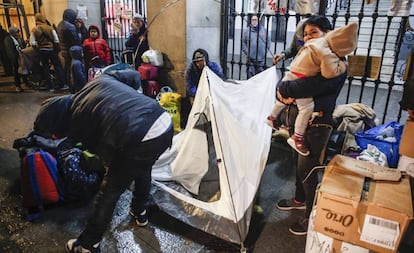Spain tops EU for asylum requests due to influx from Latin America
Over 3,500 applications are filed each week, with nationals from Venezuela and Colombia heading the list

For the first time ever, Spain has received more asylum requests than any of its European Union partners, according to official data from the European Asylum Support Office. The ongoing crisis in Venezuela and the widespread violence in a number of countries in Central America and Colombia have seen applications shoot up to 118,000 in 2019. At the start of this year, requests were at 3,500 a week. But just 5% of those applications are approved, a similar rate as Hungary and far off the EU average of 30%.
The dramatic journeys made by would-be migrants on rickety boats are often featured on Spanish news bulletins, but the more silent phenomenon of asylum seekers coming in through Spain’s airports is one of the biggest challenges facing the country. Spanish authorities are carefully monitoring the statistics that arrive each week from the European Asylum Support Office, and the numbers are alarming. The provisional figures, to which EL PAÍS has had access, show that in November of last year, all records were broken with the arrival of 3,600 asylum seekers per week. On the third week of January there were 3,700 requests.
Not even in 2015 has Spain seen so many requests, a year when the conflict in Syria pushed more than a million refugees toward Europe. That year Germany received nearly 500,000 asylum applications, while Spain got barely 15,000. The historical record was set in 1993, during the war in the Balkans.
To talk about asylum in Spain is to talk about Latin AmericaBlanca Garcés-Mascareñas, CIDOB
Changes in macro-trends in migration never have a single explanation. The cocktail of factors that has seen Spain become the leading receptor of potential refugees began in the Mediterranean. But they can also be found in the migratory policies of US President Donald Trump, in the face of the convoys of migrants from Central America, and above all in relation to the Venezuelan regime of Nicolás Maduro.
The EU’s deals with Libya and Turkey to contain migration flows to Italy and Greece have shifted the migratory pressure to Spain. But the crisis in Venezuela and gang violence in countries such as El Salvador and Honduras have prompted thousands of people to seek refuge in Spain, given the country’s historic, cultural and linguistic links to Latin America. “To talk about asylum in Spain is to talk about Latin America,” explains Blanca Garcés-Mascareñas, a researcher from the Barcelona think-tank CIDOB.
Of the current applicants in Spain, 35% come from Venezuela, 25% from Colombia, 5.8% from Honduras, 5% from Nicaragua, and 4% from El Salvador. It’s a very different makeup in in Germany, Greece and France, where a majority of asylum seekers are Syrians, Afghans and Iraqis. “The majority of the asylum seekers in Spain are not fleeing from a war in the traditional sense, but rather are fleeing structural violence,” explains Garcés-Mascareñas.
Of the current applicants in Spain, 35% come from Venezuela, 25% from Colombia, 5.8% from Honduras, 5% from Nicaragua, and 4% from El Salvador
Luis Fernando, a 23-year-old Colombian designer who works at an NGO, was forced out of Cali in 2017 due to an extortion attempt. One day he received a letter at his house. “It’s a message that the paramilitaries send to a lot of people – politicians, journalists, social leaders, NGO volunteers, civil servants, lawyers… They made it clear that they considered me to be a military target,” he explains. “I was completely paranoid, I didn’t dare to go out on the street and I stopped working.”
He ended up asking for money from loan sharks “controlled by armed groups.” Surrounded by threats from some, pressure from others and the absence of a state that could protect him, he left and ended up in Madrid in May 2019. “There is tremendous peace here,” he says.
“It’s very likely that the rhythm of requests will continue like this,” says Sophie Muller, the representative in Spain of the United Nations Refugee Agency, the UNHCR. While the Spanish Ombudsman has been warning for the last six months that the system needs to be strengthened, the numbers have caught Spain unprepared. The care network and the application processing system are obsolete and currently insufficient.
The Asylum Office is in a very sorry stateInterior Minister Fernando Grande-Marlaska
“The Asylum Office is in a very sorry state,” said Interior Minister Fernando Grande-Marlaska when he took on the role in 2018. While the office has been shored up, it is still on the brink of being completely overwhelmed. It is resolving applications faster than ever, but closed last year with 120,000 cases still pending.
Cases that should be accepted or rejected in six months are taking a year-and-a-half in Spain. The shelter space that can be offered to applicants is also insufficient. Dozens of families would be sleeping on the streets of Madrid were it not for the solidarity of parishioners, activists and local residents.
The backlog and the lack of alternatives for getting legal status in Spain have turned the asylum system into a temporary lifesaver for foreigners who have not been recognized as refugees. While their requests are being processed, applicants cannot be deported and they can start working after six months.
Reforms to the way that refugees are dealt with is a priority for the EU. The negotiations are playing out in a context of rising anti-immigrant feeling in a number of countries. Partners in the north are calling for more control, while frontline countries – Spain, Italy and Greece – are calling for greater solidarity to share out the migratory pressure.
“Spain’s position is based on the reasonable responsibility of the partners, not on the current incredible imbalance, which leaves all of the burden in the hands of the Mediterranean countries,” explain diplomatic sources. Brussels is working on a system of “obligatory solidarity” so that there is a relocation of the refugees between a critical mass of countries, EU sources add. But that deal is nowhere in sight.
Meanwhile, the new model to manage the arrival of asylum seekers will be tougher and will reject and deport so-called economic migrants faster. “In this negotiation, the Spanish government can play a role of leadership by establishing quality standards and designing a fair and agile asylum system that allows for the quick determination of who needs international protection and who doesn’t,” says Sophie Muller from the UNHCR.
It is in the midst of this European battle over border control that Spain is preparing its new asylum law. The legislation has already caused the first tensions between the governing Socialist Party (PSOE) and its coalition partner Unidas-Podemos, with the Interior Ministry’s proposals following the stricter policies set out by the EU. The text, to which EL PAÍS has had access, proposes restricting access to asylum for foreigners in migrant holding centers and includes new reasons to deny requests.
English version by Simon Hunter.
Tu suscripción se está usando en otro dispositivo
¿Quieres añadir otro usuario a tu suscripción?
Si continúas leyendo en este dispositivo, no se podrá leer en el otro.
FlechaTu suscripción se está usando en otro dispositivo y solo puedes acceder a EL PAÍS desde un dispositivo a la vez.
Si quieres compartir tu cuenta, cambia tu suscripción a la modalidad Premium, así podrás añadir otro usuario. Cada uno accederá con su propia cuenta de email, lo que os permitirá personalizar vuestra experiencia en EL PAÍS.
¿Tienes una suscripción de empresa? Accede aquí para contratar más cuentas.
En el caso de no saber quién está usando tu cuenta, te recomendamos cambiar tu contraseña aquí.
Si decides continuar compartiendo tu cuenta, este mensaje se mostrará en tu dispositivo y en el de la otra persona que está usando tu cuenta de forma indefinida, afectando a tu experiencia de lectura. Puedes consultar aquí los términos y condiciones de la suscripción digital.









































